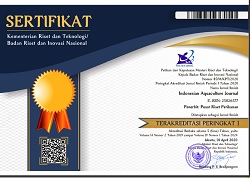CORRELATION OF MICROSATELLITE DNA MARKERS WITH GROWTH TRAITS IN STRIPED CATFISH (Pangasianodon hypophthalmus)
Abstract
Marker-assisted selection in genetic improvement of striped catfish is useful in the breeding program of the fish. Five microsatellite markers were characterized in the largest (4.03 kg ± 1.67 kg) and smallest (1.41 kg ± 0.22 kg) individuals. Five polymorphic loci were then used to genotype 160 individuals and the associations between their genotypes and growth traits were examined. The result showed that twenty-seven alleles were detected in striped catfish. The number of alleles per locus (NA) ranged from 4 to 7, with an average of 5.4 alleles per locus. The effective number of alleles per locus (NE) ranged from 3.940 to 6.939, with an average of 5.32 alleles per locus. HO and HE ranged from 0.125 to 0.944 (mean value of 0.472) and from 0.564 to 0.775 (mean value of 0.697), respectively. PIC ranged from 0.573 to 0.799 (mean value of 0.706), showing that they were highly polymorphic loci. Only one microsatellites loci (Pg13) that showed significant differences (P<0.01) in the associations between their genotypes and growth traits, while Pg3 and Pg14 were significantly associated with the standard length (P<0.01) and body weight (P<0.05). However, the Pg1 and Pg2 were not significantly associated with the body weight and standard length. Four genotypes of three loci were positively correlated with the growth traits (body weight and standard length) i.e. genotypes 194/194 for Pg3, 227/227 and 229/229 for Pg13, 279/279 for Pg14. These four genotypes can be used to identify growth traits in the molecular marker-based selection of a breeding program.
Keywords
Full Text:
PDFDOI: http://dx.doi.org/10.15578/iaj.13.2.2018.51-56

Indonesian Aquaculture Journal is licensed under a Creative Commons Attribution-ShareAlike 4.0 International License.
















_25.jpg)


